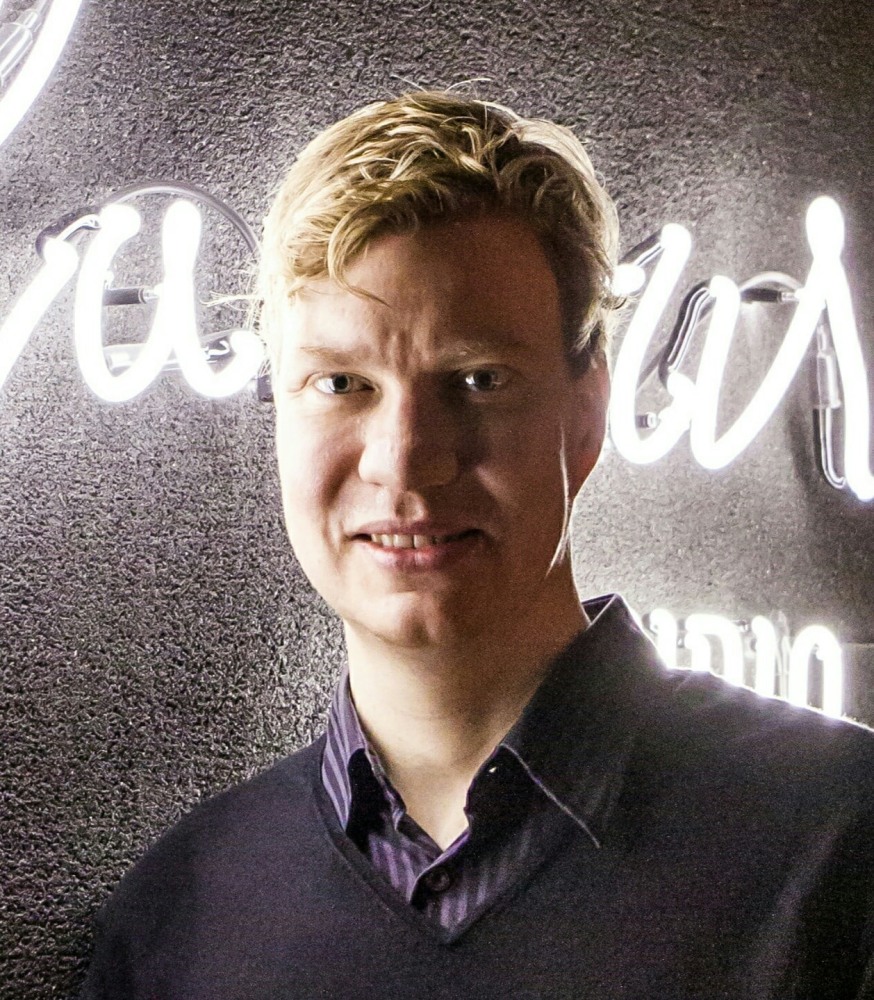
Portrait of the artist.
Born in Jyväskylä, Finland, 1976 | Lives and works in Helsinki
In his oil paintings, Sami Lukkarinen examines the relationship between digital images and painting and social media. Lukkarinen creates an intermediate space with his large pixilated paintings in which two opposite methods of presentation meet.
Pictures from the computer screen swarm around in small clumps. These pictures Lukkarinen creates as large oil paintings by examining every pixel’s color tone, one at a time. He mixes the correlating tone with oil paints and paints it with a palette knife on the canvas. The boundaries painted by the palette knife remain sharp; they overlap, over and over again, forming a three-dimensional surface on the painting. The tight organization of pixels in the digital image breaks down as the work progresses, as differently sized and directional palette-knife strokes create an individual rhythm for the painting. The works also contain a spatial element: when the works are viewed from up close; the impression is one of abstract and painted, but when viewed from further off, the figure becomes more precise.
Sami Lukkarinen paints pixelated portraits using a palette knife. His earlier paintings were reproductions of social media profile pictures, but now – keeping up with new digital trends – his recent works employ artificial intelligence. The raw material for his new portraits consists of 3,000 unpublished self-portraits –selfies – donated by volunteers as part of the long-term Unpublished project launched by Lukkarinen and artist-researcher Roope Mokka. An artificial intelligence system was taught to analyze donated photos and use them as a basis for creating portraits. Lukkarinen then intuitively chose the ones that worked best as paintings. The persons in the portraits are not real people but composites. Even so, without pictures of real people to work with, the AI system could not have learned to create credible characters. Paradoxically, then, people are present and yet absent at the same time. Lukkarinen has described how he formed an emotional bond with the AI-generated characters. Especially after studying the pictures carefully and spending time in their company, they become close, and their presence seems tangible. The artist strives to relate to them sensitively as if they were real people. Striving to connect with their human side is also the reason he paints them.
Humans read faces quickly and accurately – this is a typical feature of our species. The same mechanisms are deployed when we look at human faces generated by artificial intelligence. The automatic reaction that many people have is to push them away because there is something unsettling or even menacing about them. Their uncanniness could alternatively be regarded as interesting, perhaps even beautiful. Different artificial intelligences each have their own unique personalities, which makes them easy to humanize. AI-generated people can thus be treated with tenderness, as Lukkarinen has done. After all, artificial intelligence does its best to understand humans and humanity as strange and wondrous that sounds. We could return the favor by trying to understand AI in the same way as it tries to know us.
There’s something weird about AI, flaws, digital glitches, and such. People’s first reaction is to push them away and shut them out. But if you get over it, you begin to see real people. We all have flaws, but the personality is there in the background, behind the flaws and glitches. If you give them a little more time, you start to build a human connection.
The exhibition additionally features a series of works based on AI-generated characters composed from portraits in New York’s Metropolitan Museum of Art. For many years, Lukkarinen has taken a special interest in the connection between social media and historical portraiture. The combination of artificial intelligence and art history is indeed a fascinating one, as both lend themselves to the study of classical art history concepts, especially the laws governing perception.